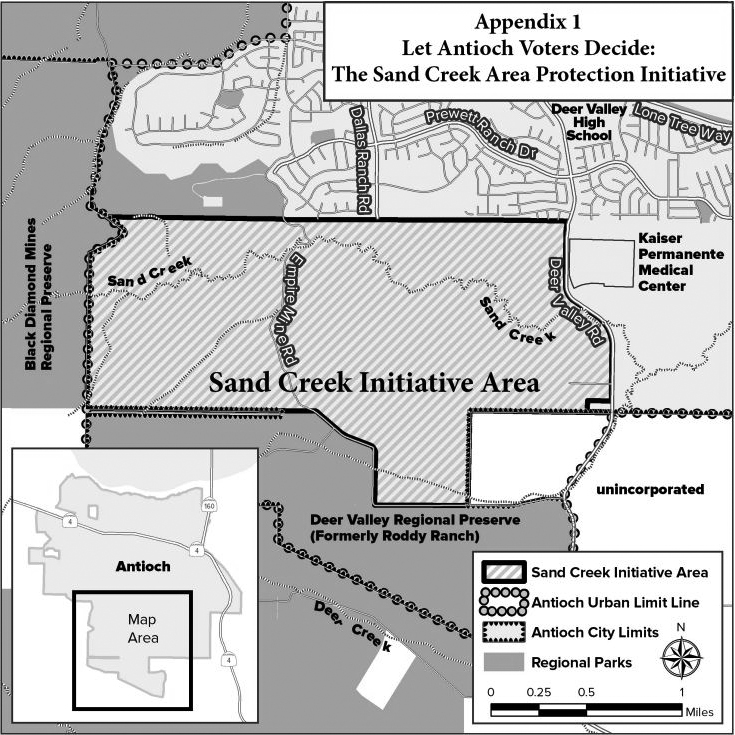State says Measure T’s growth limitations in Antioch’s Sand Creek area “cannot…be adopted, implemented or enforced”

The Let Antioch Voters Decide: The Sand Creek Area Protection Initiative known as Measure T on the November 2020 ballot cannot be implemented.
Violates state law known as SB330, the Housing Crisis Act of 2019
Would have devalued property by over 99%, downzoning it from 2 homes per acre to 1 home per 80 acres
Cities and counties must approve new homes or face hefty fines which will fund low-income housing
By Allen Payton
As was reported in news articles and an editorial by the Herald during the 2020 fall election campaign, the state has issued an opinion letter confirming that the residential growth limitations in Measure T on the November ballot, “cannot permissibly be adopted, implemented or enforced.” That’s due to the passage of SB330, the Housing Crisis Act of 2019, which went into effect on Jan. 1, 2020, also as previously reported. Known as the Let Antioch Voters Decide: The Sand Creek Protection Initiative, the measure passed by almost 79% of the vote.
SB330 added Section 66300 to California Government Code preventing cities and counties from reducing zoning of residential property by either council action or citizen initiative until Jan. 1, 2025. Also, if a city council doesn’t approve new housing within existing allowable zoning, the new law requires a court to fine the city a minimum of $10,000 per housing unit denied and force the city to approve the new homes, and require they spend the funds from the fines on additional, low-income housing.
SB330 and State Housing Law
The language of SB330 reads, “(c) It is the intent of the Legislature, in enacting the Housing Crisis Act of 2019, to do both of the following: (1) Suspend certain restrictions on the development of new housing during the period of the statewide emergency described in subdivisions (a) and (b). (2) Work with local governments to expedite the permitting of housing in regions suffering the worst housing shortages and highest rates of displacement.”
Furthermore, the act reads, “The Legislature finds and declares that the provision of adequate housing, in light of the severe shortage of housing at all income levels in this state, is a matter of statewide concern and is not a municipal affair…Therefore, the provisions of this act apply to all cities, including charter cities.”
In addition, the new law reads, “with respect to land where housing is an allowable use, an affected county or an affected city shall not enact a development policy… that would have any of the following effects: Changing the general plan land use designation, specific plan land use designation, or zoning of a parcel or parcels of property to a less intensive use or reducing the intensity of land use within an existing general plan land use designation, specific plan land use designation, or zoning district below what was allowed under the land use designation and zoning ordinances of the affected county or affected city, as applicable, as in effect on January 1, 2018.”
Also, the new law amended Section 65589.5 of the Government Code that reads, “the court shall impose fines on a local agency… in a minimum amount of ten thousand dollars ($10,000) per housing unit in the housing development project on the date the application was deemed complete.” Furthermore, the law requires, “the local agency shall commit and expend the money” from the fines “for the sole purpose of financing newly constructed housing units affordable to extremely low, very low, or low-income households.”
So, not only will the new homes in the development that was denied be built, but the city will be fined and the funds from the fines must be used to build additional, low-income housing.
Finally, According to the HCD, “Since 1969, California has required that all local governments (cities and counties) adequately plan to meet the housing needs of everyone in the community. California’s local governments meet this requirement by adopting housing plans as part of their ‘general plan’ (also required by the state). General plans serve as the local government’s ‘blueprint’ for how the city and/or county will grow and develop and include seven elements: land use, transportation, conservation, noise, open space, safety, and housing. The law mandating that housing be included as an element of each jurisdiction’s general plan is known as ‘housing-element law.’
California’s housing-element law acknowledges that, in order for the private market to adequately address the housing needs and demand of Californians, local governments must adopt plans and regulatory systems that provide opportunities for (and do not unduly constrain), housing development. As a result, housing policy in California rests largely on the effective implementation of local general plans and, in particular, local housing elements.” Each of the regions in the state must develop a plan for their Regional Housing Needs Allocation and Housing Elements.
The Bay Area’s current Regional Housing Need Allocation Plan (RHNA) projected 187,990 units needed between Jan. 31, 2015 and Jan. 31, 2023 and another 441,176 units will be needed between 2023 and 2031, according to the HCD and the Association of Bay Area Governments. In the new RHNA, it requires Antioch to add 2,481 more housing units by 2030. (See related article)
City of Antioch Letter to HCD Regarding Measure T and SB330
A letter was sent on Jan. 8, 2021 from an attorney hired by the City of Antioch to the California Department of Housing and Community Development (HCD) seeking their advice and opinion on implementing Measure T. In that letter, attorney David Mehretu of Meyers Nave asked Paul McDougall, Housing Policy Manager for HCD to review Measure T for a determination of its “validity under SB 330 as follows: Letter to HCD Re Measure T (Antioch)
- Whether Measure T’s housing development restrictions are proscribed under Section 66300(b)(1)(A) of the Government Code.
- Whether, pursuant to Sections 66300(b)(1)(B)(i) and (ii) of the Government Code, Measure T’s housing development restrictions constitute “a moratorium or similar restriction or limitation on housing development . . . within [Sand Creek] . . . to specifically protect against an imminent threat to the health and safety of persons residing in, or within the immediate vicinity of [Sand Creek] . . . ”.
- Whether Measure T acts as an impermissible cap on housing pursuant to Section 66300(b)(1)(D)(ii) of the Government Code; and
- Whether Antioch may, consistently with SB 330, enforce Measure T’s housing development restrictions.”
Response Letter from HCD Explains Why Measure T Violates State Law
In a March 9th response letter entitled “Enforceability of Measure T’s Reduction in Land Use Intensity pursuant to Housing Crisis Act of 2019 – Letter of Technical Assistance,” McDougall wrote, “the City requested the California Department of Housing and Community Development’s (HCD) opinion as to the enforceability of a reduction in the intensity of land use included in the City’s voter-approved initiative Measure T.” HCD Antioch SB 330 Letter 03.09.2021
“HCD’s opinion is based on the mandatory criteria established by the Legislature with the passage of Senate Bill 330 in 2019, known as the Housing Crisis Act of 2019,” McDougall wrote.
“HCD finds that the less intensive use provisions of Measure T are impermissible under Government Code section 66300,” and “Measure T effectively acts as a ‘…cap on the number of housing units that can be approved…’, a violation of Government Code section 66300…,” he wrote.
McDougall offered one caveat writing, “the City could enforce the reduction in intensity contemplated in Measure T, notwithstanding this opinion, if and when it concurrently changes the development standards, policies, and conditions applicable to other parcels within the jurisdiction to ensure that there is no net loss in residential capacity.” However, he further wrote, “nothing in Measure T provides for an equal increase in intensity of land use elsewhere in the jurisdiction, therefore, these provisions of Measure T cannot be permissibly adopted, implemented, or enforced consistent with Government Code section 66300.”
He concludes his letter offering the state’s opinion that Measure T is impermissible.
“Measure T appears to have been drafted to assure that housing development in the City is restricted in a manner that preserves agriculture and open spaces (Measure T, section 1). However, there is minimal analysis in Measure T to support this outcome. Measure T language more readily suggests it was passed primarily with the intent to restrict future housing development as opposed to accommodating future residential growth as intended in the City’s general plan,” the HCD Housing Policy Manager continues.
“In sum, the provisions of the voter-approved Measure T result in a lesser intensity of land use and create a development cap, resulting in a reduction in the total number of housing units that can be built within the Initiative Area than what is currently allowed in the City’s General Plan. Accordingly, HCD is of the opinion that such a reduction in the intensity of land use created by Measure T cannot permissibly be adopted, implemented, or enforced consistent with Government Code section 66300,” McDougall concluded.
Measure T is Moot, Council Must Approve New Homes
Therefore, as previously reported, the state has confirmed that Measure T, which would have devalued four privately owned parcels on the west side of Deer Valley Road by over 99% from two homes per acre to just one home per 80 acres, is moot and will have no impact on the development of new housing in Antioch. It would have affected less than 900 housing units remaining of the total 4,000 homes allowed in the City of Antioch’s Sand Creek Focus Area of the general plan. But now those housing projects will move forward in the planning process and can be expected to be approved.
That’s because the council must adopt all new housing projects in the Sand Creek area and anywhere else in the city, until Jan. 1, 2025, which don’t require any zoning changes or general plan amendments, or the city will face state fines of $10,000 per unit, at a minimum, and the homes will still be approved and allowed to be built, and the fines fund additional, low-income housing in the city, according to SB330.
the attachments to this post:

HCD Antioch SB 330 Letter 03.09.2021

Antioch SB 330 TA Letter 03.09.2021

Letter to HCD Re Measure T (Antioch)

























